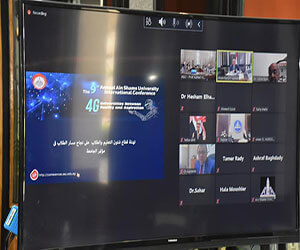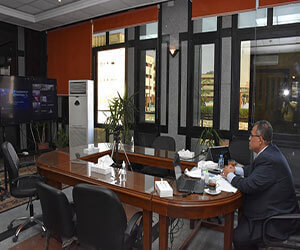The Education and Student Affairs Council discusses the continuation of completing the second semester and the precautionary measures
Through video conference technology, the Council of Education and Student Affairs held its regular session chaired by Prof. Dr. Abdel-Fattah Saoud, Vice President of Ain Shams University for Sector Affairs, and the membership of the faculties' Vice Deans for education, students and Academic staff member from abroad.
Where the Council discussed with the faculties a plan to continue completing the work of the second semester and emphasize the follow-up of the implementation of all precautionary and precautionary measures to ensure the safety of students and all members of the university community.
Prof. Dr. Abdel Fattah Saoud congratulated the Faculty of Engineering represented by the Dean of the Faculty, Prof. Dr. Omar Al-Husseini, and Prof. Dr. Mustafa Refaat, Vice Dean of Education and Student Affairs, on the occasion of the first prize for three of its students in the fourth year of the World Design Studio (WDS), Department of Architecture - Faculty of Engineering, Ain Shams University which presented by Sodic in cooperation with the Greek campus at the student level for their Town Square project (Dina Hazem, Rania Essam, and Hussam Kasem). This victory is a great victory, confirming the leadership of the Faculty of Engineering at Ain Shams University and its students in pioneering engineering and architectural ideas at the student level in all faculties, as this studio aims to cooperate with faculties from three continents, representing Ain Shams University from Egypt, Huasing University of Agriculture from China and Clemson University from the United States of America, the first of its kind in the world.
With the Faculty of Engineering sincerely thanks to the university administration represented by Prof. Dr. Mahmoud El-Metini, "President of the University" and Prof. Dr. Abdel Fattah Saoud - Vice President of Education and Student Affairs, for providing all means of support necessary to mobilize the energy of young students and direct them in the optimal path and document the culture of support The moral for the distinguished students by honoring the holders of the advanced centers and the representatives of the university honorable representation in the various competitions and activities to document and motivate students to practice various activities in various fields, keeping up with the role of the state in its support for various activities to build a personality capable of drawing a better future for the country and increasing students' confidence in themselves and their abilities this contributes to their entry into the labor market with courage, enthusiasm and high ambition.
The session included reviewing the success of the sector’s participation in the university’s ninth scientific conference entitled “Fourth Generation Universities between Reality and Ambitions”, through simulation models with effective and distinguished student participation that enriches the conference’s axes under the supervision of Faculties' Deans and Vice-Deans, and sincere thanks to the vice Deans and members of the Council for the distinguished preparation for the distinguished participation of the sector in the conference, and the recommendations of the education and student affairs sector sessions directed to higher education institutions were reviewed, the content of which was to deepen the awareness campaigns for their professors, researchers, students and employees on the importance of creativity, innovation and entrepreneurship, and their use to link The educational and research process in universities with the state plan for sustainable development 2030, and the development of teaching methods and curricula to urge undergraduate and BA students to research, apply, innovate, use modern technologies, work in an interdisciplinary system, link curricula with reality in the labor market and industry, and organize training courses and workshops for faculty members, The assisting body and students to develop intellectual design and principles of creativity, innovation and entrepreneurship to be influential and effective members of the innovative awakening in higher education institutions
 |
 |
|
The conference also recommended providing an appropriate budget, developing sustainable plans, organizing competitions aimed at attracting innovators and innovators from various disciplines, providing the necessary support to develop their skills and providing material and moral incentives to motivate them to creativity and innovation and work on marketing the outputs of their work, as well as encouraging the establishment of applied research centers to attract innovative students and researchers to work on Developing solutions, products and services to meet the needs of civil society and industry, promoting the idea of technology transfer, increasing the inspiring co-working spaces in the buildings of its faculties and providing them with the Internet and appropriate display and communication technologies to encourage their professors, researchers, students, and employees from all disciplines to meet and dialogue to generate interstate and specialized ideas and planning to transform them into projects or emerging companies .
The recommendations also included increasing support and attention to business incubators and accelerators as an open, flexible and supportive environment for innovators and creators to motivate and support them to transform their ideas and research into emerging companies that contribute to the Egyptian economy and sustainability in higher education institutions, and increase communication with graduates to benefit from their experiences in the educational process, and to participate in training programs in their faculties which is interested in the activities that contribute to the employment of its graduates, linking them to the labor market, linking the educational process with achieving societal benefit, and including the students' community activities in their academic evaluation.
This is in addition to increasing the involvement of civil society institutions, the private sector, and government institutions in their educational, research and innovative activities to integrate their institutional, market and industrial experiences and benefit from their resources and work on joint projects that benefit the economy and society, and to deepen and increase cooperation with universities and international companies to exchange experiences and open new research, development, innovation and investment partnerships, and the establishment of an investment fund to invest in applied research projects and start-ups, and to support the innovative and entrepreneurial awakening in them, and to realize their plans for sustainable development.


.svg)



